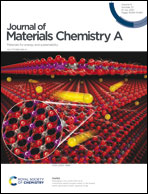Sandwich hydrogel with confined plasmonic Cu/carbon cells for efficient solar water purification†
Abstract
Designing a low-cost and efficient evaporation system to maximize solar energy utilization is of great importance for the emerging solar water purification technologies. Herein, we demonstrate a universal sandwich hydrogel fabricated by confining plasmonic Cu/carbon cell solar absorbers in the evaporation surface of the PVA hydrogel to achieve high-efficiency solar water purification. Owing to the superior light absorption and efficient thermal management, the fabricated device exhibited an excellent water evaporation rate of 2.08 kg m−2 h−1. Moreover, the solar absorber usage of the sandwich hydrogel evaporator was reduced by 50% in comparison to the general reported homogeneous hydrogel, and without deteriorating the energy efficiency. Careful investigations on the internal stress and electron transfer between the plasmonic Cu nanoparticles and carbon cells revealed that the simple in situ catalytic growth strategy achieved the goal of protecting Cu nanoparticles for plasmonic heat generation, which rendered the composite solar absorbers an excellent light-to-heat conversion efficiency of 93.43%. As a proof-of-concept demonstration, the obtained sandwich hydrogel also reduced the concentrations of heavy metal ions by four to six orders of magnitude after simultaneous one-step adsorption and solar distillation, which is comparable to some of the current purification techniques. It is believed that the successful combination of the broadband absorption biomass carbons and the plasmonic non-precious metals may open up a new pathway for designing high-efficiency and low-cost photothermal materials in the near future.



 Please wait while we load your content...
Please wait while we load your content...